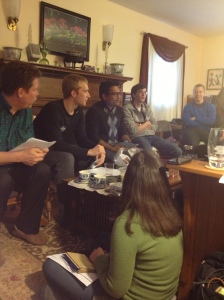By Andrea Lowe, EWB-DC Cameroon Public Health Subgroup Member
In addition to water assessments, the Cameroon team will be conducting public health assessments as well.
Why public health?? Well, since public health is the discipline of protecting and improving the health of communities, it is a perfect marriage with engineering projects designed to bring clean water to communities. With clean water, Mbohkop residents could experience less water-borne illnesses (things like cholera), spend less time trying to get to a water source, and have enough water to sustain themselves, their animals, and their community as a whole. In addition, there may be other health issues that people are having, but have not been accounted for. But, we can’t understand any of this without information!
During this first trip, the team will be conducting focus groups and key informant interviews with Mbohkop residents to better understand the health and environmental issues related to their quality of life. So what is a focus group? Well, have you seen that Parks and Recreation episode where they conduct a focus group? It’s kind of like that! Focus group interviews generally consist of 3-10 people and key informant interviews are one-to-one interviews. During both of these, a moderator (an EWB-DC team member) will guide an open-ended conversation and remain an impartial party in the conversation letting the community voice their opinions and perspectives on a variety of topics. The Public Health team started by holding a Town Hall meeting this past Tuesday, inviting leaders from the entire community to weigh in on any issues, and using this time to recruit participants for focus groups.
The team is conducting 16 focus group interviews with community members; 4 with each local tribe (Mbum, Fulbe (Mbororo), Yamba, Fumte), divided by gender (2 male/2 female groups per tribe). Key informant interviews will be conducted with the local Water Committee members, Community Health Workers, governmental Primary School Teachers, and Julius, our main point of contact with the community. Finally, the leaders involved with the Town Hall meetings include village elders, religious leaders from Christianity, Islam, and African Traditional Religions, mission members, and Islamic School teachers.
Although all three groups are very different, our team will be asking them very similar questions. For example, our team will be asking what they think EWB is doing there, and what they perceive as the greatest health problem in their community. The team is also spending quite a bit of time asking about water use, access, sanitation, and storage. Many of these questions will help inform the educational topics that will be discussed later on the blog. With enough information, we should be able to determine what additional health problems are occurring in the area, how well the community will accept and maintain this new water system, and any behavioral changes they may need to make in addition to using the new water system to ensure the community stays healthy. This also helps us establish a baseline for health issues in the community so we can measure the impact overtime of the engineering projects that EWB-DC will implement with the community.
TRAVEL UPDATE: The team is doing well and is healthy with the exception of a few sunburns. The community has been incredibly welcoming and a lot of progress is being made with the various assessment activities. The updates we receive back here are limited, but we will be sure to share more as we are able.

